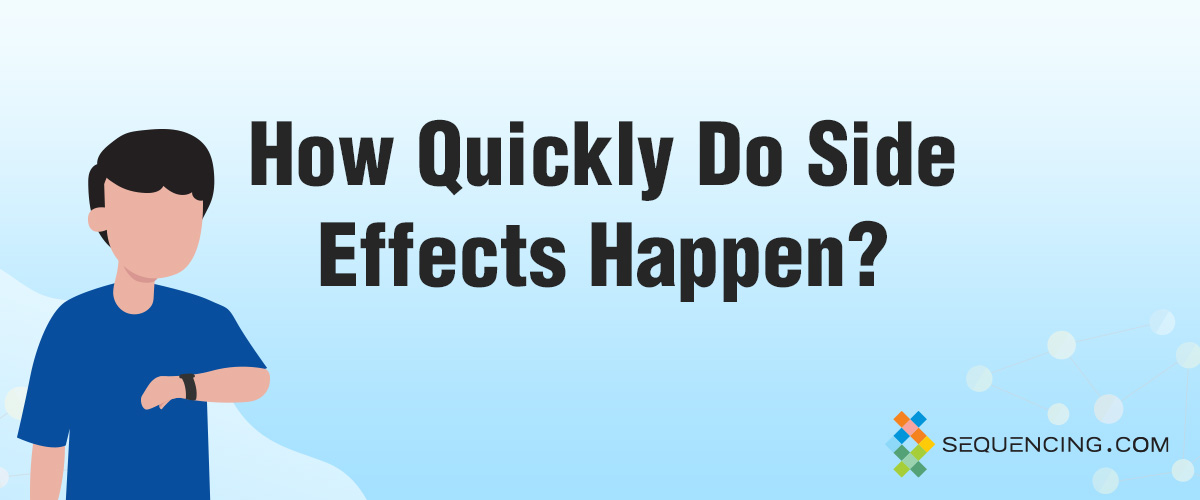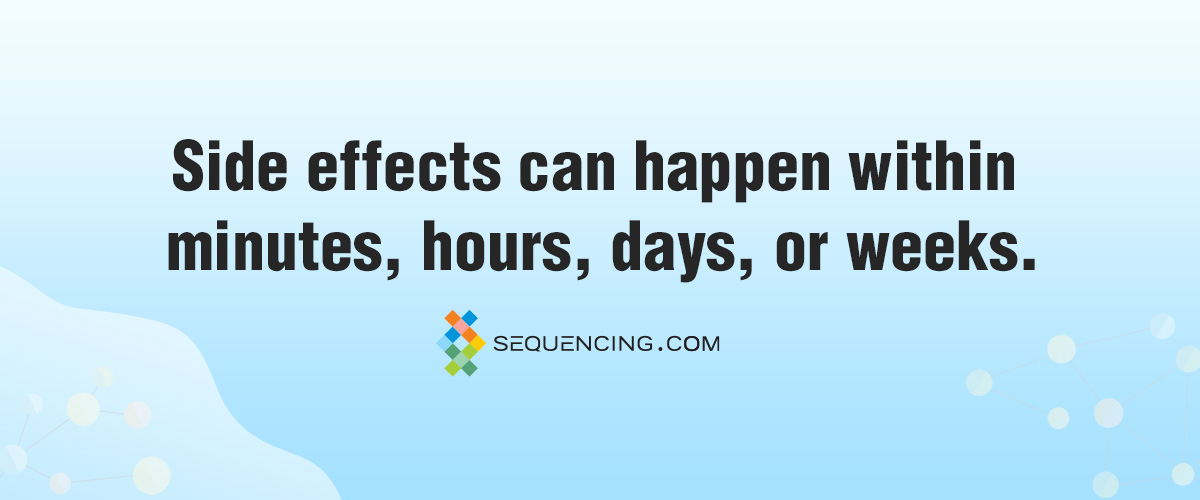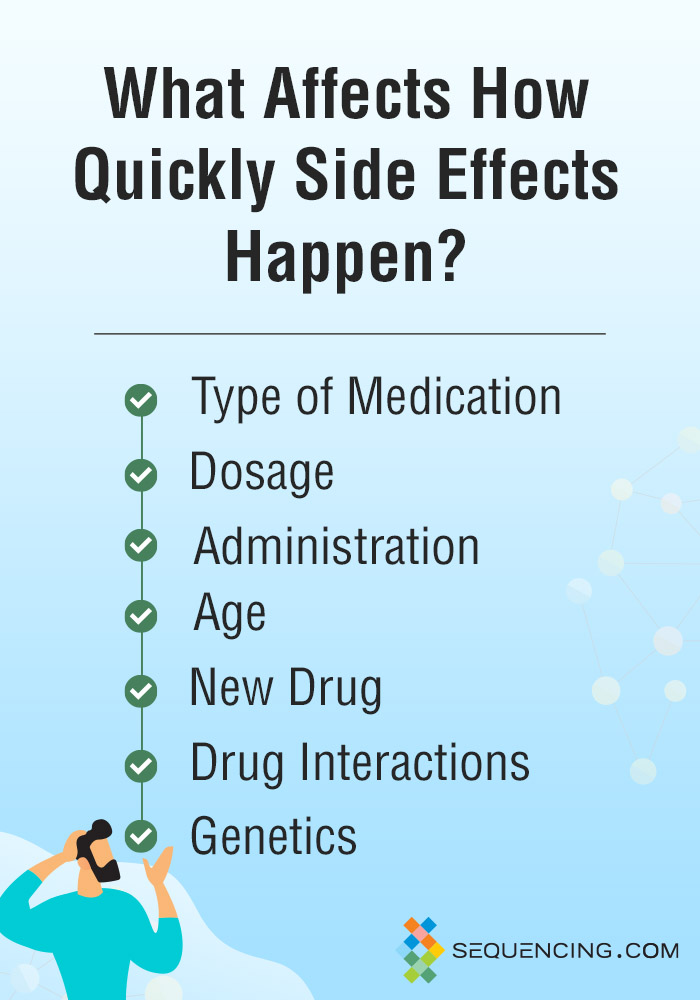
By Dr. Brandon Colby MD, a medical expert specializing in preventive medicine and clinical genomics.
You've started a new medication and you're not feeling well afterward, so now you're asking yourself, "How quickly do side effects happen?".
The answer to this question is that it depends.
Why Side Effects Happen
It can be difficult to know if you're suffering from a medication side effect of your meds or a new symptom. The first step in understanding how quickly side effects happen is to know the effects of medicine on the body. When someone takes a new medication, the body doesn't recognize it. The prescription drug or over-the-counter medicine is unknown to the immune system. This can cause it to work harder to fight it off, but most medications are strong enough to continue on their path to achieving their goal - to treat the problem.
Unfortunately, the drug can end up in a place it wasn't intended for first, such as the stomach. Since there isn't anything wrong with the stomach and the medication isn't for that area, it may cause an upset stomach. This adverse reaction is usually mild and temporary.
Other common side effects include:
- Dry mouth
- Rash
- Hives
- Headache
- Constipation
- Nausea
- Vomiting
- Dizziness
- Drowsiness
- Fatigue
The above side effects are usually nothing to be concerned about and don't last long. However, there are some serious side effects you should be aware of and reach out to a health care professional.
Possible side effects requiring medical attention include:
- Anaphylactic reaction (life-threatening allergic reaction)
- Suicide
- Heart attack
- Cancer
- Liver problems
Call 9-1-1 or your doctor immediately for medical advice when medicines have side effects that are life-threatening.
Learn more about what to do when medicines have side effects.
How Quickly Side Effects Happen

Side effects can happen very suddenly or take hours, days, or weeks to develop. How quickly side effects happen depend on several factors:
Type of Medication
Certain medications have a higher chance of side effects than others. For instance, someone who has a mental health disorder may receive a prescription for an antidepressant, and most of them cause people to suffer from adverse events. These side effects usually take days or even weeks and months to develop, which is why most people have to follow up with their prescribing doctor to ensure they are not negatively affected by the treatment.
Brand name vs. generic medication matters too. Some people find they don't experience side effects with brand name drugs like they do with generic ones. The time it takes to feel those effects depends on the medication and the other factors addressed below.
Over-the-counter drugs have a lower chance of side effects than prescription drugs offered by physicians to treat medical conditions.
It's a good idea to check the medication guide that comes along with the prescription medicine or the United States Food and Drug Administration website at www.fda.gov for information on potential side effects they have collected from clinical trials.
The information provided will help you know whether what you're feeling are side effects from your medications or from some other illness. While it may not provide timeline information on how quickly side effects happen, they can help you identify if the medication you took minutes, hours, or days ago is making you sick.
Learn more about the effects of medicine on the body.
Dosage
The higher the dosage the higher the chance the person will suffer from side effects. An example of this is someone who is taking blood pressure medication. If a higher than necessary dose is taken, the person may suffer from dizziness or fainting because it reduces blood pressure too much.
This side effect may happen within minutes to an hour since blood pressure medication is designed to act quickly to lower high blood pressure.
Administration
Administration has to do with how someone takes the medication. Orally-administered medications have the highest incidence of side effects. This is because it has to engage with many areas of the body before getting to the treatment area.
The fastest drug reaction someone would have is when taking medication intravenously - the slowest is through oral administration.
Age
Younger individuals may suffer from drug side effects much quicker than older adults because they process medications much faster. The faster the medication goes through the body, the faster it can cause the person to feel sick.
New Drug
Introducing a different drug in the body can cause side effects that can benefit or worsen a health condition. For instance, statins are used to lower high cholesterol. This class of medications, however, can also affect people's blood pressure.
If someone has normal to low blood pressure and they take statins to lower their cholesterol, they may suffer from dizziness, fainting, and nausea because it is causing the blood pressure to plummet. This side effect can happen quickly because statins are also designed to act fast since high levels of cholesterol are dangerous to the heart.
Drug Interactions
Taking more than one drug can cause an increased risk of adverse reactions because of their interaction. The side effects from this usually happen quickly because it doesn't take long for the chemicals to combine in the stomach, especially when taken together.
Some healthcare providers will recommend taking certain medications hours apart for that reason. Drug interactions can happen with dietary supplements and herbal supplements, and stopping them or waiting to take them with medications can reduce the likelihood of side effects.
Genetics
Genetics is another factor in how fast someone starts to suffer from adverse effects. People are genetically predisposed to being sensitive to new drugs.
This is why many people decide to have their DNA analyzed for medication and drug responses.
Learn more about how long side effects last.
What You Can Do to Reduce Side Effects of Medicine
You do not have to continue suffering from side effects of your medication. By knowing which medications your unique body handles best, you can reduce side effects of medicine by having your doctor prescribe the right medication and the right dosage for you.
To find out which medications your body does the best with, consider getting a DNA test or upload your raw DNA data to Sequencing.com.
Medication and Drug Response Advanced Pharmacogenomics Analysis
Sequencing.com offers a Medication & Drug Response DNA Report that includes information about your risk of side effects with common medication as well as your risk of addiction to certain medications and illicit drugs.
Those who have already had a DNA test by 23andMe, AncestryDNA, MyHeritage, FamilyTreeDNA, and Dante Labs can upload their raw DNA data easily to Sequencing.com's secure and confidential account. Our Privacy First commitment ensures your data remains private. We never sell or share your data, including your DNA data, with anyone.
For those who have not yet taken a DNA test and don’t have raw DNA to upload, you can purchase a DNA test kit online. Once the DNA test has completed, your DNA data will be stored in your confidential Sequencing.com account and ready to use with the Medication & Drug Response DNA analysis app or another report from the wide assortment available from Sequencing.com.
About The Author
Dr. Brandon Colby MD is a US physician specializing in the personalized prevention of disease through the use of genomic technologies. He's an expert in genetic testing, genetic analysis, and precision medicine. Dr. Colby is also the Founder of Sequencing.com and the author of Outsmart Your Genes.
Dr. Colby holds an MD from the Mount Sinai School of Medicine, an MBA from Stanford University's Graduate School of Business, and a degree in Genetics with Honors from the University of Michigan. He is an Affiliate Specialist of the American College of Medical Genetics and Genomics (ACMG), an Associate of the American College of Preventive Medicine (ACPM), and a member of the National Society of Genetic Counselors (NSGC).
